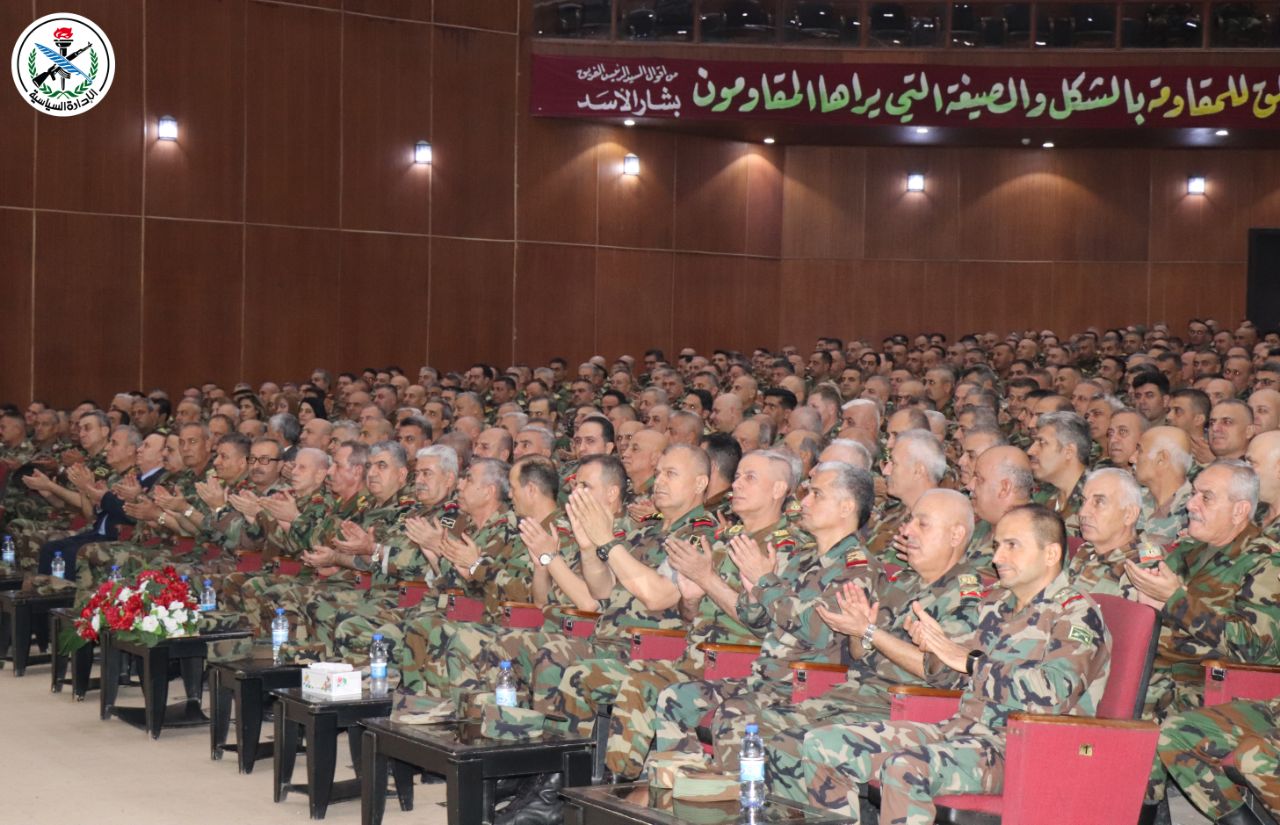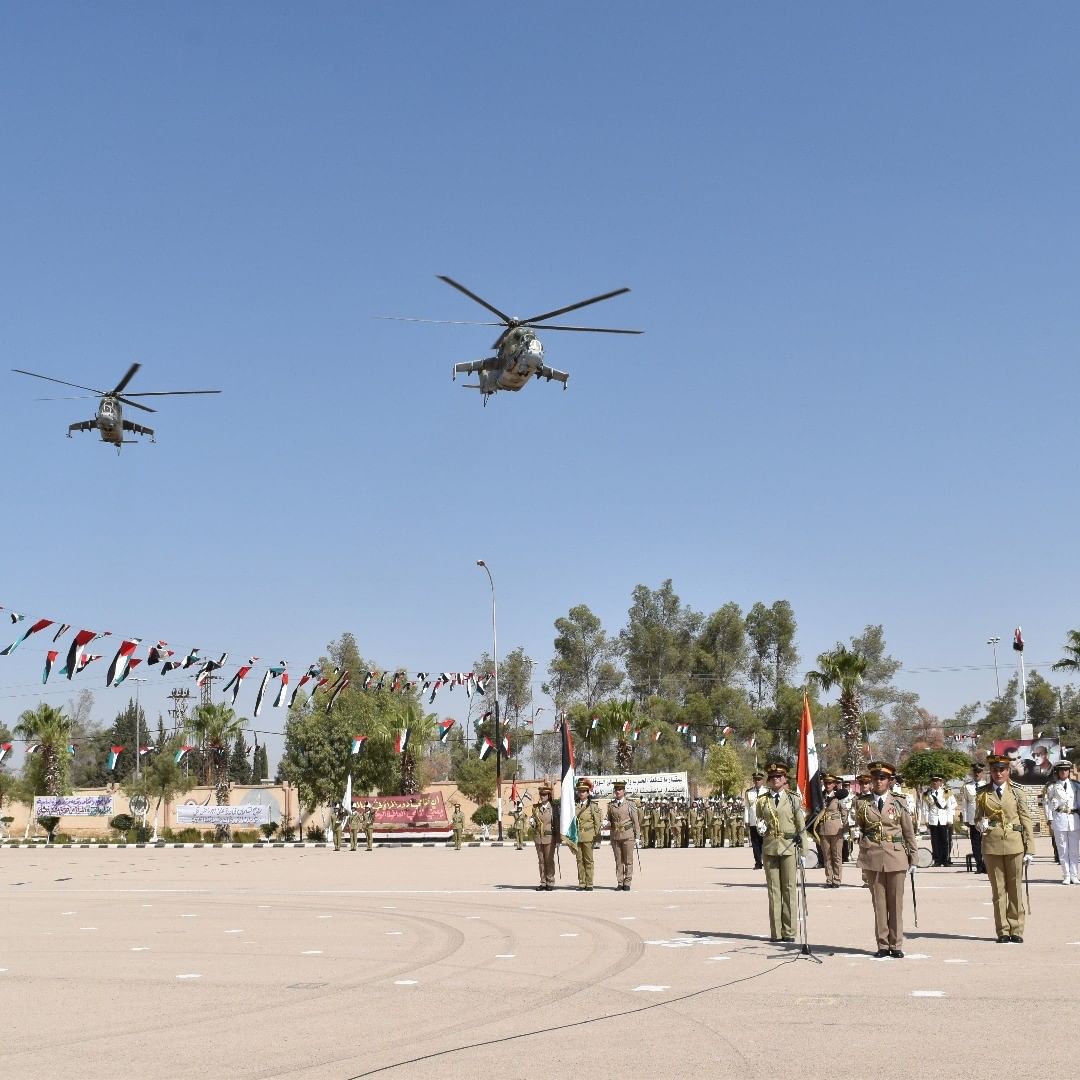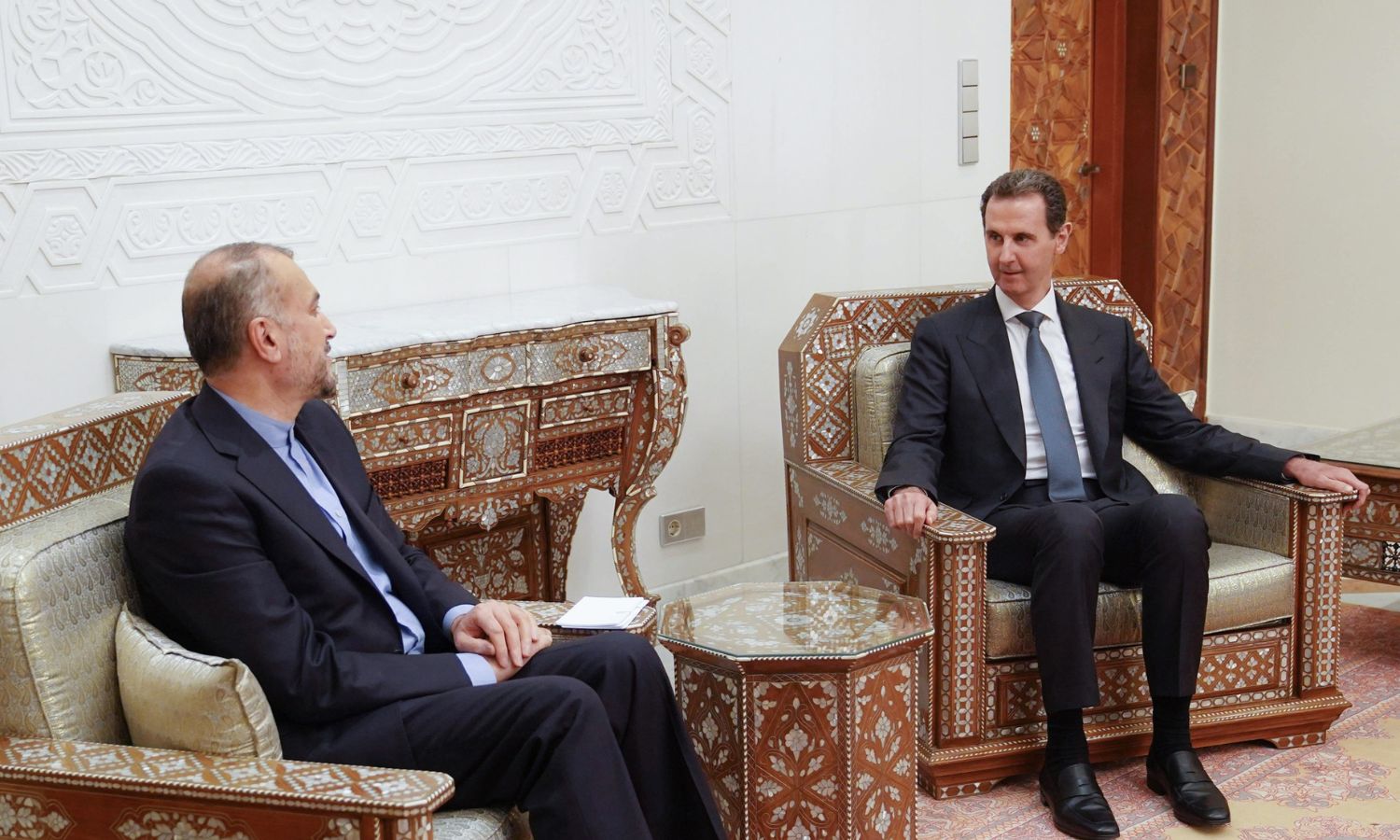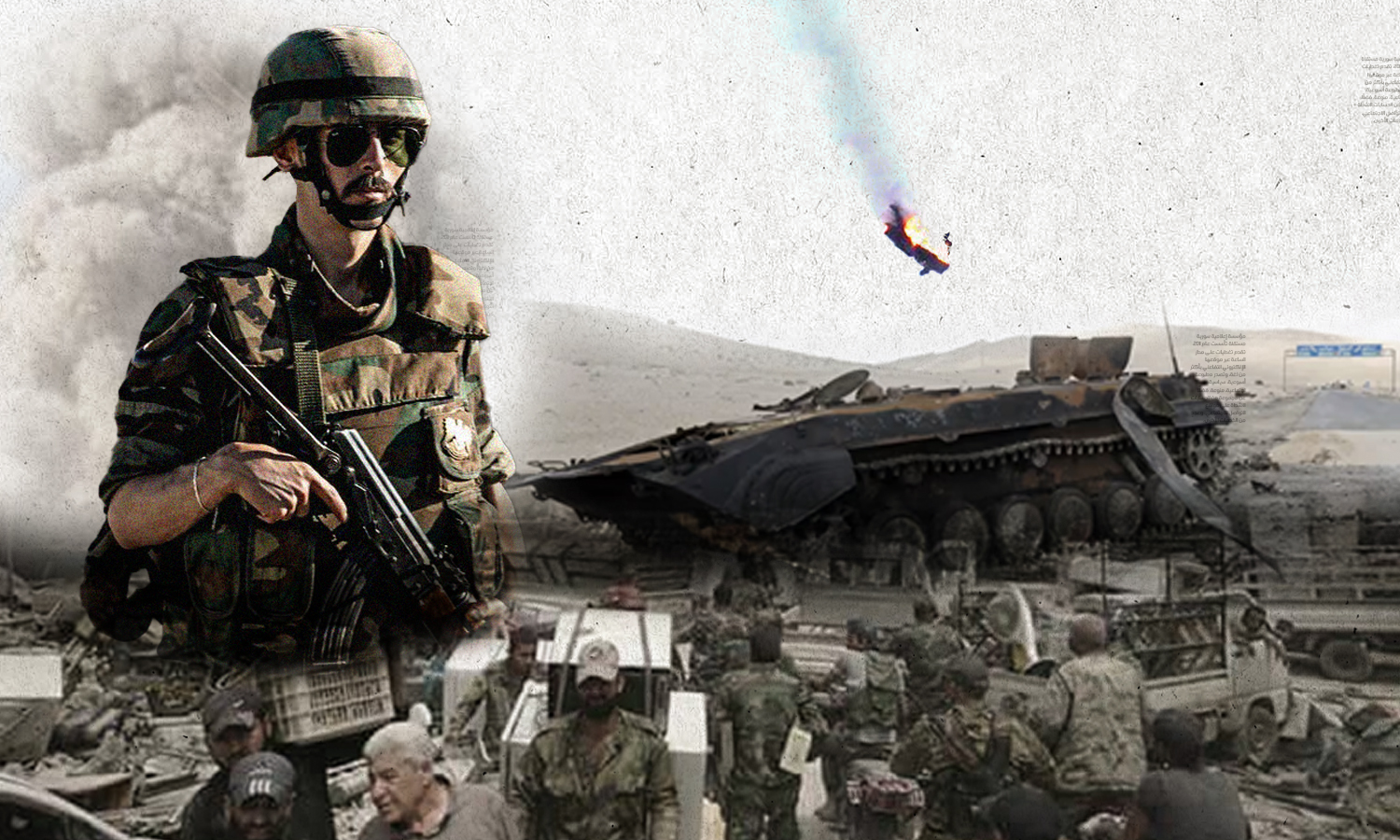Khaled al-Jeratli | Yamen Moghrabi
About 13 years of war have eroded the regime’s military establishment in Syria as a result of a long campaign it began in 2011 to suppress Syrian protests.
It subsequently turned into military confrontations between it and unofficial armed and paramilitary groups, some of which represented the armed opposition factions, and some of which came from outside the borders declaring hostility to the regime and the opposition at the same time, such as the Islamic State group (IS).
With the paths to cool the fronts launched by international and regional actors in the Syrian file, Russia began training operations for units of the Syrian army on advanced war tactics in an attempt to create what the Russian Ministry of Defense previously called a “modern air force.”
Recently, the Syrian regime issued a series of decisions related to the military institution. The Director of the General Administration of the Ministry of Defense, Maj. Gen Ahmed Suleiman, said during an interview with the Syrian Alikhbaria channel that they aim to create “a modern and advanced professional army, by decision of Bashar al-Assad.”
In this file, Enab Baladi discusses with experts and researchers the regime’s efforts to create a “modern” army and the possibility of implementing these ambitions in light of the Russian-Iranian hegemony over the military establishment in Syria.
Decisions to enhance discipline
About a month ago, the Ministry of Defense repeatedly issued call-ups to volunteer in the ranks of its forces, with “attractive” wages that workers in the Syrian military sector do not receive, and it also set the duration of military service, unusually.
During 2023, Enab Baladi monitored a set of internal decisions and circulars in the military institution, during which a set of decisions were imposed related to the mechanism for soldiers’ interaction with the Internet and communication with allies, in addition to other instructions aimed at reducing leaks.
Last September, the ministry issued a circular in which it asked military personnel not to pass any military information to the Russians, Iranians, and Hezbollah members present in Syria.
This was preceded by circulars seen by Enab Baladi, in which they demanded that soldiers in the regime’s army not send any information or documents directly to the Iranian and Russian leaders, in addition to requiring the delegations of the parties themselves to obtain approval to visit the headquarters of the regime’s military forces, and in the event of the presence of escorts, they must obtain a prior security approval.

The regime does not seem to have the ability to transform its military forces into professional forces or to rebuild and restructure them in light of the current economic crisis – September 14, 2023 (Ministry of Defense)
Is regime moving towards a “modern army”?
Following training on parachuting operations conducted for members of the Syrian regime forces, the Russian Ministry of Defense issued statistics in which it said that between 2022 and 2023, paratroopers in the regime’s army carried out more than 17,500 parachute jumps, of which more than 8,000 took place during the night.
These exercises led to the qualification of more than 20 soldiers from the regime forces as trainers, to train in parachuting operations, with the acceptance of self-training of individuals in parachuting.
The Russian Defense Ministry said that it is continuing the process of establishing a “modern air force” for the regime.
Defected Brigadier General Abdullah al-Asaad told Enab Baladi that there is no relationship between the training conducted by Russia for units of the Syrian army and the formation of a professional army in Syria.
The military expert added that these exercises were previously conducted periodically before 2011 and included the forces of the elite Republican Guard, the Fourth Division, and the Special Forces, in addition to reconnaissance units in the brigades and military teams.
Al-Asaad pointed out that these military tactics and training did not result in a “professional army” even before the start of military operations in Syria.
The military expert believes that the quantity or quality of training, or the laws presented in the army, do not play a major role in forming a “professional army,” but rather, the quality of the individuals selected within this army is the basis.
Al-Asaad continued that the “army doctrine” is the priority for forming a professional army, but this was not previously available in the Syrian army, as the applicable “doctrine” was “the doctrine of personal benefit and pragmatically protecting the leader from the interior.”
What is military doctrine?
The Egyptian Institute for Studies provided four definitions of military doctrine:
- The scientific theory or philosophy and military policy of a state that expresses its official views relating to the basic rules of armed conflict, including the nature of war and methods of managing it.
- The foundation and driving force of military history and the thinking mind that sets events, details, and plans.
- The general military policy pursued by the state, within the framework of the basic principles related to the affairs and purpose of war.
- The knowledge, preparation, and use of the state’s armed forces for the purpose of securing it and organizing the management of armed conflict to achieve political doctrine.
Source: Egyptian Institute for Studies
Loyalty is key
The Oxford Dictionary says that “today’s professional soldiers are better trained and prepared for combat than their citizen forebears. However, professionalism does not merely refer to improved performance but to a quite different ethos which informs the all-volunteer force,” adding that “Critically, professionalism has become a shared reference point for today’s soldiers, uniting them in training and on operations so that even soldiers who do not know each other personally can work together.”
The “professional army” contradicts its “ideological” counterpart, according to what stated by the Center for Eastern Studies.
“As the Cold War ended, it became much less important for European countries to maintain mass armies and related systems for universal mobilization in the event of war. At the same time, defense solutions such as these have become less popular with the public,” said the think tank.
Any army can be professional, but we must ask how and why professionalism is a requirement. The regime’s army has the structure of a professional army and relies on the eastern formation in dividing its units, but the basic idea here is the human element in it, which makes it difficult to move towards a professional army.
Mohsen al-Mustafa, Researcher at the Omran Center for Strategic Studies
Mohsen al-Mustafa, a researcher specializing in civil-military relations at the Omran Center for Strategic Studies, told Enab Baladi that it is difficult for the Syrian regime’s army to be professional, especially since loyalty plays a “pivotal role” in promotion and appointment to positions, not professionalism.
Based on the above, the researcher believes that the formation of a professional army is an “unattainable” goal for the Syrian regime.
Brig. Gen al-Asaad, for his part, said that the Syrian army has been based on “corruption” for years, and it cannot one day be able to ward off crises from the country.
Al-Asaad pointed out that the Syrian army had previously, and even during the period preceding the Syrian revolution, received support from many parties, even from the Gulf states.
The defected brigadier general indicated that during his period of service in the Syrian army, he witnessed donations coming to the military institution from other countries or other armies.
Al-Asaad here means donations, financial aid, or in-kind aid, but they did not help in creating a professional army because its structure was based on “sectarian selectivity, not equal opportunities.”

The Syrian regime’s army is considered an ideological army according to military definitions – September 2023 (Defense Ministry)
What about allies?
Dozens of irregular militias are spread in Syria and in areas controlled by the Syrian regime specifically, some of which are funded by international and regional parties, such as militias of a radical Shiite nature, which Tehran has funded for years.
On the other hand, these groups are parallel to military groups established by Russia in Syria, but since 2021 they have gradually begun to move toward joining the Syrian army, such as the Eighth Brigade, which Moscow formed in Daraa governorate from the remnants of the opposition factions whose control ended in July 2018.
The Malcolm Kerr-Carnegie Middle East Center published a study in 2020, in which it indicated that Russian advisors have been using their experience in modernizing the regime’s forces since 2015, to prepare an effective structure, at a time when the regime faces a difficult task of organizing its forces, especially since developing these forces is a priority for the regime.
Mohsen al-Mustafa, research fellow at the Omran Center for Studies, concluded in a study he previously prepared on the structure of the Syrian army that it is possible to notice that the chain of command and orders in the structure of the Syrian army and armed forces was greatly affected after 2011.
Al-Mustafa attributed this impact to variables and factors, most notably the military intervention of the regime’s allies and its growing impact day after day.
In particular, Russian influence is greater than that of Iran in the structure of the army and armed forces, within official circles of influence and informal networks.
This was sometimes reflected in the form of exceeding the official commitment to the chain of command and orders and breaking its traditional centralization in a way that led to the difficulty of imposing complete control and actual control over some military units, according to the researcher.
Despite the growing Iranian and Russian influence on the military establishment, Bashar al-Assad, as “President of the Republic and Commander-in-Chief of the Army and Armed Forces,” still officially controls the chain of command and orders.
However, this formal control does not mean complete control over the appointments of the chain of command and the flow of orders within it and may be subject to balances with allies as necessary.
Iran has no interest
For years, divisions and brigades in the regular Syrian army have been known to be subservient to Iran at all levels, most notably the Fourth Division, led by Maher al-Assad, the brother of Bashar al-Assad.
Some security detachments throughout the Syrian geography were also known to be affiliated with Iran, such as Military Security throughout Syria and State Security in Deir Ezzor governorate in particular.
In an article published by the Middle East Institute about the Fourth Division in 2021, it said that it had become the “number one” militarily due to the unlimited Iranian support and the powers open to it over the entire Syrian territory.
Marwan Farzat, a political analyst specializing in Iranian affairs, told Enab Baladi that Iran has no interest in conducting any restructuring of the Syrian army that might weaken its influence within it.
Farzat ruled out the possibility of restructuring the army in its true sense, noting that it may be limited to dissolving some of the militias that the regime actually has the ability to dissolve, provided that they are not affiliated with Iran.
The expert pointed out that dozens of militias that were formed over the past years away from foreign influence in Syria, such as the National Defense militia or the Ba’ath Brigades and others, were funded by businessmen and figures affiliated with the regime.
He added that Iranian influence within the Syrian army is not limited to the armed factions within it.
Over the past years, Iran has been able to buy out the liabilities of many Syrian army officers in various military sectors, with the aim of keeping the regular army weak inside the state and keeping the militias loyal to it stronger than the regular army, as is the case with Hezbollah in Lebanon, and the Popular Mobilization Forces in Iraq.
Marwan Farzat, A political analyst specializing in Iranian affairs
Farzat said that Iran is working to weaken the regular army as a first step, and to strengthen its irregular militias, and then legitimize the presence of these militias, which is what happened based on previous experiences, whether in Lebanon, Iraq or Yemen.
Today, militias that were once small military groups in Lebanon or Iraq can be seen in ministerial statements aiming to form a government in the country, which will happen in Syria later.
Omran’s research fellow al-Mustafa said during his interview with Enab Baladi that Iran has focused on creating and importing foreign militias.
Al-Mustafa added that Tehran is not actually interested in restructuring the army. On the other hand, we find it interested in signing military agreements with the regime’s army, allowing it to deploy militarily within its units, in addition to technical and military agreements that allow it to be a supplier of weapons and military equipment and develop them.
The think-tank fellow believes that Iran actually wants a “non-strong” regime, but not to the point that it leads to its collapse, and this also applies to the Syrian military establishment.
Orabi Orabi, an expert on jihadist groups, said regarding Iran’s efforts to form military groups with a radical orientation that Iran is not interested in establishing a “professional” Syrian army but rather tends to establish strong control inside Syria.
Orabi pointed to Enab Baladi, the interference of Iranian militias in the Syrian military establishment, pointing to the strength of the Iraqi army, in which Shiite officers loyal to Iran control the decision-making joints, given that this model is what Iran tends to create in Syria.
Although those controlling the Iraqi army’s decision-making are loyal to it, Iran has maintained its armed militias outside the military establishment and, under religious names, roaming Iraq.
Russian attempts
Al-Mustafa of the Omran Center for Strategic Studies told Enab Baladi that since the Russian military intervention in Syria for the benefit of the regime, “serious steps” have begun to restructure the army, but the political desires of the regime have resisted some changes.
He added that some of the changes that Russia made to the strength of the Syrian army did not prove effective at times, which prompted it to retreat from some of them, as happened with the restructuring of the First Division, between transforming it into a “Mika” division and then returning it as a tank division.
Al-Mustafa believes that Russia is interested in making these changes, but with its preoccupation with the war in Ukraine, its efforts in this regard have been affected, or the war itself may have slowed down its efforts in this regard.

Graduation of a military course for female students from the Military College 2020 (Ministry of Defense)
Is there economic capacity?
The economic crisis that struck the foundations of the Syrian regime’s rule, affected by international sanctions, entered the corridors of the military establishment years ago.
This crisis was reflected in decisions issued by the regime’s Ministry of Defense during the past year, most notably regarding fuel, the food sector, and aid to the military.
Since September 2020, the army’s Supply Department has witnessed a severe crisis in securing food for the army.
Enab Baladi obtained information at the time from a non-commissioned officer in the Supply Department in Homs, which stated that the food sector in the military institution witnessed a deficit that reached 11 billion Syrian pounds.
This was followed, in early 2022, by a circular issued by the Director of the Supply Department of the Logistics and Catering Authority of the regime’s army, Major General Shuaib Ibrahim, stipulating that the feeding program be amended by deleting bananas from the program and adding oranges instead.
According to the circular bearing the number “14,” a copy of which Enab Baladi saw, “the feeding program is amended for all formations that obtain their food supply from supply centers in Damascus, Douma, Kiswah, Homs and Palmyra.”
The military institution bid farewell to the year 2022 with a circular from the Ministry of Defense that included all military units, which stipulated reducing the amount of fuel allocated for heating from nine liters of diesel to three liters per month.
Circular “3604,” a copy of which was seen by Enab Baladi, stated that the public interest required “rationalizing the use of fuel as much as possible,” and according to it, soldiers’ monthly quotas from heating diesel allocations would be reduced.
In view of the accumulated bad economic situation in the military institution, which has reached the army’s “food bowls,” the question arises about the possibility of rebuilding the army in light of the economic crisis in Syria.
Omran’s research fellow, al-Mustafa, told Enab Baladi that most of the mechanisms that the regime is seeking to implement so far are not considered very costly at the economic level.
He added that the regime has the ability to bear the cost of what is currently happening, especially since the restructuring is taking place at legislative and administrative levels until now, ruling out that there will be any funding allocated to the regime to restructure the army.
At the same time, al-Mustafa did not rule out the presence of minor funding given to the regime to keep it alive, and here the regime may work to allocate part of this public funding to support its forces.
It is usual for funding from other countries to be allocated to the purchase of weapons or military equipment, which are usually at a high cost, and the regime in its current state cannot afford it.
Mohsen al-Mustafa, A research fellow at the Omran Center for Strategic Studies
Extra-budgetary movements
On December 13, the Syrian regime’s People’s Assembly approved the draft state budget law for the fiscal year 2024, with a total amount of 35,500 billion Syrian pounds, distributed among 26,500 billion Syrian pounds for current spending, and 9,000 billion pounds for investment spending, and the total deficit reached 9,404 billion pounds, according to the state-run Syrian News Agency (SANA).
No details were issued regarding the expenditures referred to in the budget, including those related to the military aspect, and the Ministry of Finance usually relies, when publishing the budget law, on the phrase: “The appropriations allocated to the Presidency of the Republic and the Ministry of Defense are allocated within the appropriations of Section 19202,” and these appropriations are placed at the beginning of the fiscal year at the disposal of each of them pursuant to a decision issued by the Minister of Finance.
Dr. Firas Shaabo, Ph.D. in Economic and Financial Sciences, told Enab Baladi that the Syrian regime’s basic resources for restructuring its forces are currently limited to its allies.
Shaabo added that this matter is actually being done by the Russians forming corps that they directly control, such as the Fifth Corps, which is far from the interference and financing of the regime, with the possibility of Russia benefiting financially from the corps through cross-border smuggling operations.

Bashar al-Assad and Iranian Foreign Minister Hossein Amir Abdollahian – October 13, 2023 (Facebook/Syrian Presidency)
Understandings determine policies
The Arab Initiative, according to which the Syrian regime has gradually returned to its Arab surroundings since the beginning of this year, does not directly provide for the restructuring of the Syrian regime’s military forces, but it is possible, according to the general changes that al-Assad is trying to portray through the media, that this change in the military forces will come based on understandings with him, or with his allies, especially with the expected changes in the region as a result of the Israeli war on Gaza.
The Arab Initiative consists of three stages: near, medium, and long, the second of which stipulates the removal of Iranian forces from Syria, the reduction of its military presence, the withdrawal of militias and Lebanese Hezbollah forces, and engaging in reconciliation with the opposition.
The Jordanian Initiative obtained by Al Majalla magazine on June 25, reveals that “Amman, along with Arab capitals that directly support it, and Western capitals that tacitly endorse it, still consider the withdrawal of Iran from Syria as their ultimate goal in exchange for lifting sanctions, rebuilding Syria, and the withdrawal of the United States.”
In its third phase, the initiative included the regime’s announcement of an end to military operations related to “armed conflict,” with the exception of combat training against parties designated by the United Nations.
Rami al-Khalifa, professor of political philosophy at the University of Paris, ruled out during an interview with Enab Baladi that the military changes in the Syrian regime were linked to the initiative.
Al-Khalifa said that the regime’s policies in the military sector and its modernization “may later be linked to the Arab Initiative or international understandings, especially since we have witnessed during the recent period greater reliance on the Prime Minister and his presence, but I doubt that we have reached this point, and even if there are understandings or requests and responses from the regime, it will remain a formal response that does not touch the core of the regime itself.”
According to a circular seen by Enab Baladi, in January 2021, the alert rate in departments affiliated with the armed forces was reduced, according to each department, from 66 to 33% for administrative headquarters and from 80 to 50% for its units.
As for the land and naval forces, their readiness was reduced from 100 to 80%, while the readiness of military hospitals remained at 80%.
The number of army fighters declined by about two-thirds after 2011, and in 2012, “Russian and Iranian military assistance prevented the collapse of the regime and its forces,” according to a study by the Tawazun Research Center, which estimated the number of army fighters in 2020 at 169,000.
The center evaluated the efficiency of the Syrian army in terms of military professionalism, governance, social and cultural outlook, civilian qualifications, and the economy of the defense sector as low.
if you think the article contain wrong information or you have additional details Send Correction
النسخة العربية من المقال
-
Follow us :
Most viewed
- Turkey moves to deploy air defense system in Syria
- Intentions for popular resistance amid Israeli escalation in southern Syria
- SDF to withdraw from Aleppo neighborhoods following agreement with Damascus
- Washington's conditions raise questions about its openness and goals in Syria
- Daraa mobilizes against Israel... Civilian casualties













 A series of amendments aimed at restructuring the Syrian regime forces after 13 years of militia control and attrition in battles (Edited by Enab Baladi)
A series of amendments aimed at restructuring the Syrian regime forces after 13 years of militia control and attrition in battles (Edited by Enab Baladi)





 A
A
A
A
A
A








 More In-Depth
More In-Depth